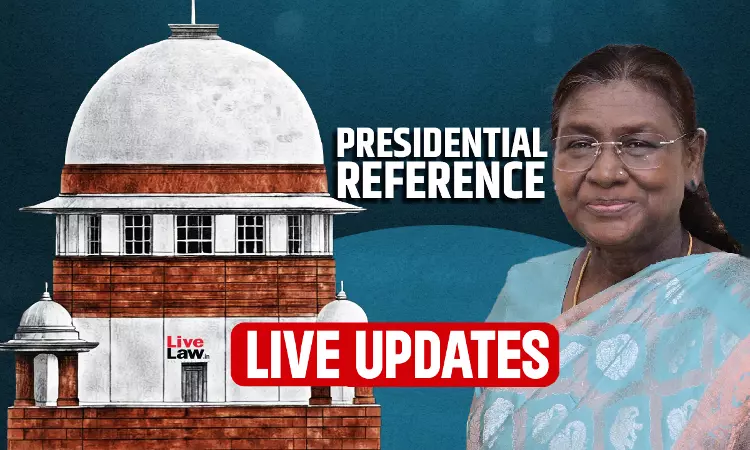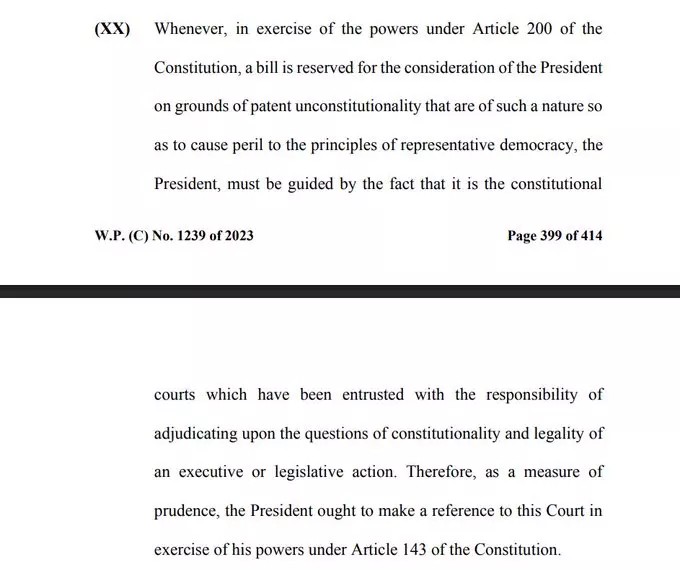Supreme Court Hearing-Presidential Reference On Timelines For Bills' Assent-DAY-6 : Live Updates
LIVELAW NEWS NETWORK
2 Sept 2025 10:28 AM IST

Live Updates
- 2 Sept 2025 2:27 PM IST
Singhvi: Rajindra Rana referred
CJI: again an individual case-we don't say herein after in all matters, we will decide within 3 months.
Singhvi: supreme court is the fatest court and to take decision in this case, it takes 7 months but I did the Punjab and other case, it took less than that. 3 month guidelines is a general norm post this case.
CJI: there is only two such cases-Keisham and Telangana.
Singhvi: on Article 145-only those substantial questions which are not decided may be referred. In Abdul Rafim, a substantial question ceases to be that if its already decided.
- 2 Sept 2025 2:21 PM IST
Singhvi: a paradigm of 200 delay which is on record of legislative assembly for over 3 or 5 years delay is not met with either 226 or 32 and it is takes minimum of a year and you then become pocket veto, killing of bill and super chief minister and then mylords timeline then is too little,too late...mylords will be defeating the whole exercise if its limited to individual cases.
- 2 Sept 2025 2:21 PM IST
J Nath: the court should go into the shoes of Governor and see all three options, why only deemed assent!
Singhvi: that may not be the correct analogy. If mylords see the chart for 20 Bills
J Nath: individual cases can always be examined, you come here saying three or four months have passed..the court will see what it can do
Singhvi: TN and Kerala cases came in that fashion but it was found that inordinate delays are repeated
J Nath: why do you want to amend the constitution
- 2 Sept 2025 2:17 PM IST
Singhvi: In Article 200, the timeline object is to have an guidance which is adhered to. Assume timelines is given and it is not followed, two judges said that there is consequence of deemed assent or contempt. We are not here to discuss to contempt.
CJI: Article 143 appears to be that you are impose it on President-whether President does not have machinery? That she can take advice from Attorney General but to say she ought to
J Narasimha: suppose parties come to us asking for extension
CJI: we get so many letters from district judges that court has fixed so much time to complete trial and that they must grant some extension
- 2 Sept 2025 2:14 PM IST
Singhvi: a general timeline is amenable to the structure of Article 200 and 201
J Nath: we will have to amend the constitution to impose the timelines
CJI: in individual cases, aggrieved party can go under Article 200. There could be different exigency in different cases
Singhvi: mylords is dealing with the contemporary situation of huge delay. There has to be an amendment to Constitution, its an ideal thing. In Manipur and all, there were unoccupied silence which necessitated...mylords may agree that despite no constitutional amendment, timelines have been imposed.
- 2 Sept 2025 12:55 PM IST
Singhvi: questions 10, 11 and 13-
Article 142(draft Article 118) has been misunderstood, it was one of the few articles passed without any controversy. Two amendments cited but never moved.
CJI: can we lay down straightjacket formula for exercising of power of Governor under Article 142?
Singhvi: suppose mylords have clear implicit that mylords can't touch under Article 142- but is there a fetter under Article 142 is the question
- 2 Sept 2025 12:51 PM IST
Singhvi: question 8, Article 143 reference-is President required to mandatorily come everything there is doubt- nobody is saying that President is mandatorily obliged to come under Article 143
CJI: that has arisen in view of the two-judge
Singhvi: we all agree that she is not obliged. But that is a wrong impression given-the two judge does not make it mandatory-see the language-completely distorted question asked-it is an empowering para-it is a measure of prudence
CJI: what is ought to other than mandamus?
Singhvi: prudence means discretion as in an option-'may not be mandatory' is the first option and as measure of prudence she can do that.





